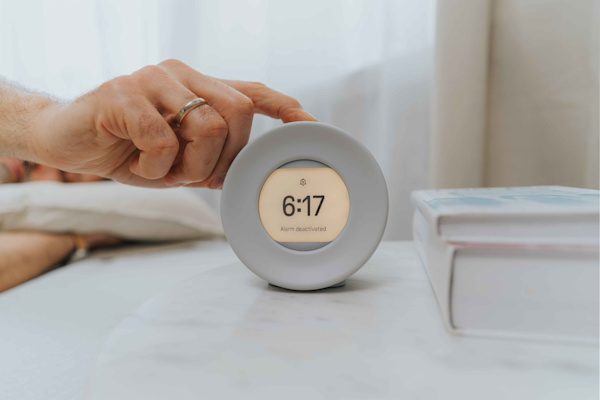
How to reset your circadian rhythm?
How to reset your circadian rhythm?
Are you having trouble falling asleep? Are you waking up at the same time every day, no matter what time you go to bed? If so, then there's a good chance that your circadian rhythm is out of whack. That's because your internal clock isn't syncing up with the natural light-dark cycle of the day and night. If left unchecked, this problem could lead to insomnia and other sleep disorders. In this article we'll explain what a circadian rhythm is, how it works in our bodies, and how we can reset it when things go awry.
What Is a circadian rhythm?
A circadian rhythm is a natural process that occurs in all living things on a daily basis. It is the internal clock that controls the sleep-wake cycle and other body functions, including digestion and hormone release. Circadian rhythms have been found in many different organisms, ranging from plants to insects to mammals.
The sleep phase is made up of two parts: the sleep phase and the wake phase; these combine to keep humans awake during daylight hours, then help us get adequate rest at night. The human body's internal clock controls this rhythm by sensing ambient light levels and adjusting hormones accordingly—for example, suppressing melatonin production during daylight hours so we can stay awake longer without feeling sleepy; increasing melatonin production at night in order to promote drowsiness and facilitate sleep

How does your internal clock work?
The circadian rhythm is a biological clock that regulates many physiological processes, including the sleep-wake cycle and other behaviors. Our circadian rhythms are influenced by light and darkness, so they're regulated by a part of the brain called the suprachiasmatic nucleus (SCN). The SCN receives information on whether it's light or dark outside (in order to adjust our internal clocks) from specialized cells in our eyes called rods and cones. You can thank these two types of cells for helping you see properly during daylight hours when it's important for survival, since rod cells work well at night when we don't need them much anyway!
How does our circadian rhythm affect sleep quality?
When we talk about the circadian rhythm, we talk about light and dark as well. When it's light out, our bodies produce melatonin (the hormone that makes you sleepy). As soon as it's dark, that stops happening. If you're sleeping in a room with a lot of light or no curtains on your windows and someone has left the TV or lights on while they're sleeping—or if there are street lights outside—this can prevent your body from producing enough melatonin to help you fall asleep quickly and stay asleep throughout the night.
You might remember hearing about circadian rhythm when we talked about jet lag—that’s because when our body travels across time zones, our clocks get out of sync with what time it actually is where we’re going (and vice versa). The same thing happens when you go to bed later than usual on a work night because of an extra-long Netflix binge session; eventually, after staying up too late for too many nights in a row, all these extra hours will catch up with you!
What can disrupt our circadian rhythm?
Jet lag.
Shift work.
Changes in your sleep schedule.
An irregular/inconsistent sleep pattern.
Exposure to light at night, such as a computer screen or smartphone before bedtime.
What are the consequences of a circadian rhythm that's been thrown out of whack?
If your circadian rhythm is out of whack, you may experience a wide range of symptoms. These can include:
Poor sleep quality
Difficulty waking up in the morning
Tiredness or fatigue during the day
Trouble concentrating on work or play tasks
Mood swings (for example, feeling irritable or sad)
If left untreated, a disrupted circadian rhythm can lead to other health issues as well. Some of these include obesity and diabetes; depression; heart disease and stroke; mental illness including anxiety disorders and schizophrenia; cancer; seasonal affective disorder (SAD), also known as winter depression
The best way to rest your circadian rhythm
The best way to rest your circadian rhythm is to keep a consistent sleep schedule with regular exposure to sunlight, at the correct time of day. The sun is the most important environmental cue for resetting your body clock. Sunlight will help you shift your sleep cycle forward if it is lacking in the early morning, or back if it's late afternoon or evening light that is keeping you awake at night.
If you can't spend time in a natural setting where there's lots of bright sunlight (like outdoors), then try using a bright lamp on the desk where you work or study during daylight hours so that natural light exposure isn't entirely lost while indoors—just make sure it's not too bright since excessive artificial light can have negative effects on sleep cycles as well! Otherwise, use dimmer settings and avoid screens altogether before bedtime (which may be earlier than usual if they've been used before heading off to bed).
Additionally, make sure you refrain from exposure to blue light from digital devices before sleep and stop using your smartphone as an alarm. Switch to a traditional alarm clock, like Mudita Bell or Mudita Harmony for a better quality sleep and a more pleasant wake-up experience.

Resetting your circadian rhythm is important if you want to get a good quality sleep every night.
If you want to get a good quality sleep every night and wake up feeling refreshed, it is important to reset your circadian rhythm. The amount of sleep you need depends on your age. For example, babies need around 16 hours of sleep per day, while young adults only require 7-8 hours per night.
Your circadian rhythm (the natural 24-hour cycle that regulates your body’s internal clock) is closely linked to the amount of daylight and darkness in your environment. So, when we talk about resetting our circadian rhythms, we are referring to waking up at the same time during the week as well as weekends, so that our bodies can adapt better and feel more alert throughout the entire 24-hour period.
Bottom line
A healthy circadian rhythm is important for maintaining a normal sleep schedule and improving your overall quality of life. If you’re looking to reset your internal clock and get better rest at night, there are a few simple things you can do. These suggestions include getting enough sunlight during the day so that it will help regulate melatonin production at night or taking melatonin supplements before bedtime if light therapy isn’t possible for whatever reason.
On our resource page, Sleep Better, we wrote extensively about the importance of sleep and the positive impact a good night’s rest has on our health and overall well-being.
If you would like to read more articles about the importance of sleep, rest & relaxation, check out these additional articles:
Also, consider joining our Mudita Community on our forum.
Related stories

Mudita Surpassed Kickstarter Goal for Harmony 2 & Bell 2
We are thrilled to announce that our recent Kickstarter campaign for the Harmony 2 and Bell 2 alarm clocks has been a success!

Mudita’s Summer Reading List Recommendations
This summer, make the most of your downtime with these engaging reads, recommended by the Mudita Community.

The Top 6 Things That Interfere With Kids' Sleep
Discover the top factors that disrupt children's sleep and learn effective strategies to overcome them.
If you'd like to receive the best stories from our blog, keep up to date with our progress and get notified about our product releases and special discounts.